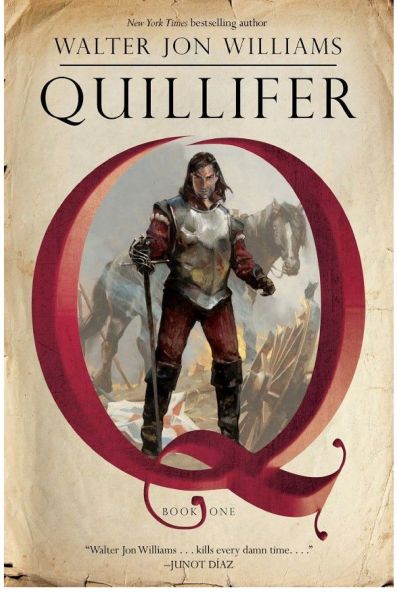A Parcel of Rogues
Quillifer
By Walter Jon Williams

25 Sep, 2018
Walter Jon Williams’ 2017 Quillifer is a standalone secondary-world fantasy.
Amiable womanizer Quillifer is dispatched to serve a summons on river-stealing aristocrat Sir Stanley. Quillifer is enthusiastic about the mission; it lets him skip boring apprentice-lawyer duties. He is less enthusiastic about the prospect of a confrontation with a notoriously violent land-owner.
The mission has an unexpected benefit. Quillifer returns home to Ethlebight to find the seaport town in flames. A vast pirate fleet has invested the town and is in the process of carrying off much of its population for ransom or slavery. Quillifer is safe, albeit bereaved. His entire family chose to die rather than submit to the pirates. His master, Lawyer Dacket, is also lost.
Quillifer could choose to stay in Ethlebight and help rebuild. He chooses otherwise.
An official expedition under the command of a young aristocrat named Utterback arrives to survey the damage and determine what, if anything, should be done. Seeing an opportunity, Quillifer talks his way into a position as the Embassy Royal’s secretary.
Trouble strikes again. The party is attacked by bandits while en route to the capital. Quillifer and the surviving members of the party are captured; there is nothing to do but wait for ransoms to be paid. Or so it seems, until our protagonist inadvertently wakes the sleeping goddess Orlanda. The charming Quillifer soon adds a divine being to the list of women he has seduced; she in turn ensures his safe escape.
With a goddess on his side, nothing can go wrong for Quillifer. Or perhaps not.
Having mortally offended Orlanda by politely declining her offer of blissful cohabitation, Quillifer makes his way to the capital. Opportunity beckons. All he need do is endear himself to the newly crowned Queen Berlauda and riches will surely be his. Endearment should be easy; Quillifer is nothing if not charming.
But … there are rival claimants to Duesland’s throne. Civil war soon breaks out. Quillifer does the queen a favour she will never forgive. And of course, he is nowhere safe from the fury of a spurned goddess.
How’s that charm working out for you now, Quillifer?
~oOo~
My introduction to Williams was back when he was being published as Jon Williams. Years before he broke into science fiction, Williams wrote historical fiction. Specifically, he published five books in the Privateers & Gentlemen series: To Glory Arise (AKA The Privateer), The Tern Schooner (AKA The Yankee), Brig of War AKA The Raider), The Macedonian, and Cat Island.
The series was told from the perspective of Captain Favian Markham, a naval officer of one of the minor villainous powers in the War Against the Beast of Corsica. There was also a roleplaying game, which I also own.

In this novel, Williams has created a secondary world technologically similar to early 19th century Europe. It is an age of wooden ships and iron men, a world quite like that sketched in the Privateers & Gentlemen series. The raiders who sack Ethlebight are drawn from the Barbary raiders who, from the 16th and 19th centuries, gave many people uncompensated employment opportunities in the Muslim world.
And yet Quillifer is not Markham reimagined as a fantasy character. Duesland is neither Georgian Britain nor a republic of slavers. Duesberg is a monarchy nominally at peace with its neighbours. Nepotistic, aristocratic, inefficient, it does have functioning royal divorce courts. As a result, Berlauda is threatened by several ex-queens and their offspring, all of whom are eager to try their hand at grabbing power. No, not Georgian Britain.
The general tone of the novel is comic. Quillifer is a serial womanizer, but no George Wickham, seducer of young innocents. Quillifer prefers partners as cynical and clear-eyed as he is. The amatory adventures of charming cads as they meander from bed to bed has been the stuff of comedy for centuries.
Unfortunately for Quillifer, his is an era of pirate fleets, bandit armies, and civil war, not to mention vindictive goddesses. Were the protagonist to have his druthers, he would probably prefer life in some comfortable niche, one that gave him the funds and freedom to drift from one meaningless assignation to another. His author prefers to drop the lawyer into an endless series of life and death situations, to provide him with opportunity after opportunity to rise to the occasion. Or die.
Come to Duesland for the bawdy encounters. Stay for the blood-soaked battlefields and the terrors of war.
Quillifer is available here (Amazon) and here (Chapters-Indigo).
